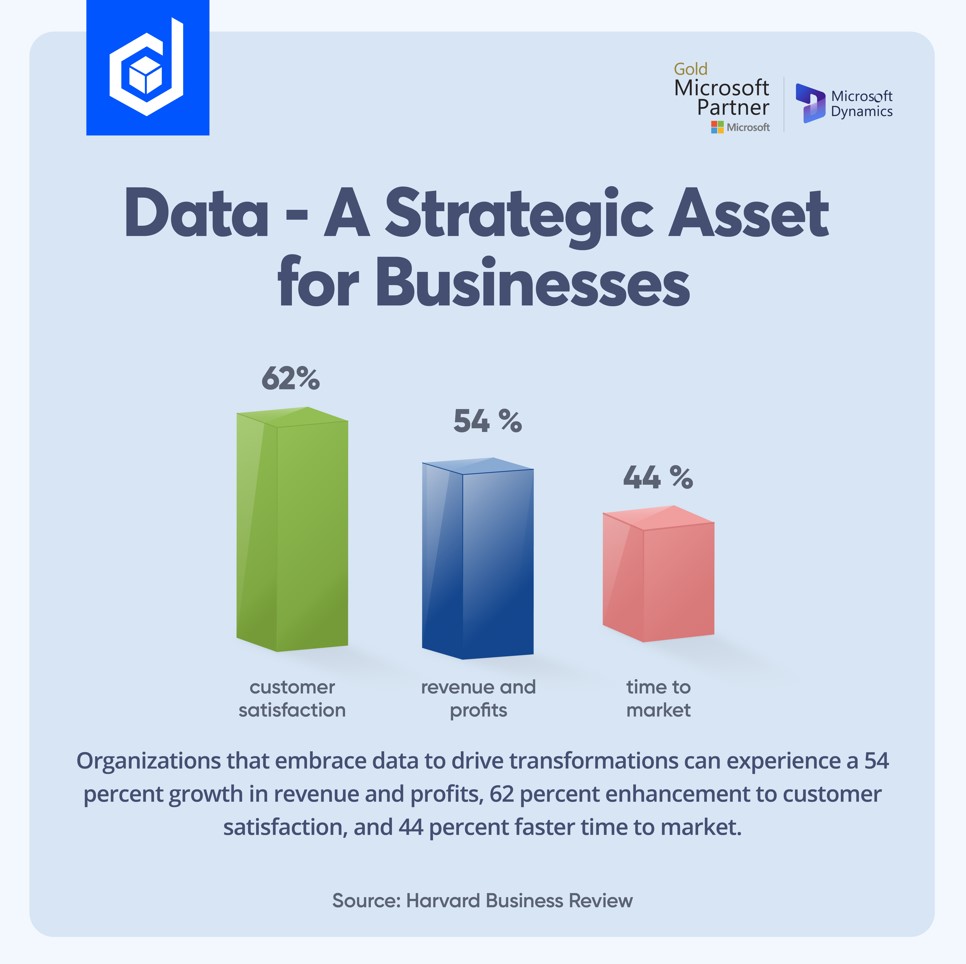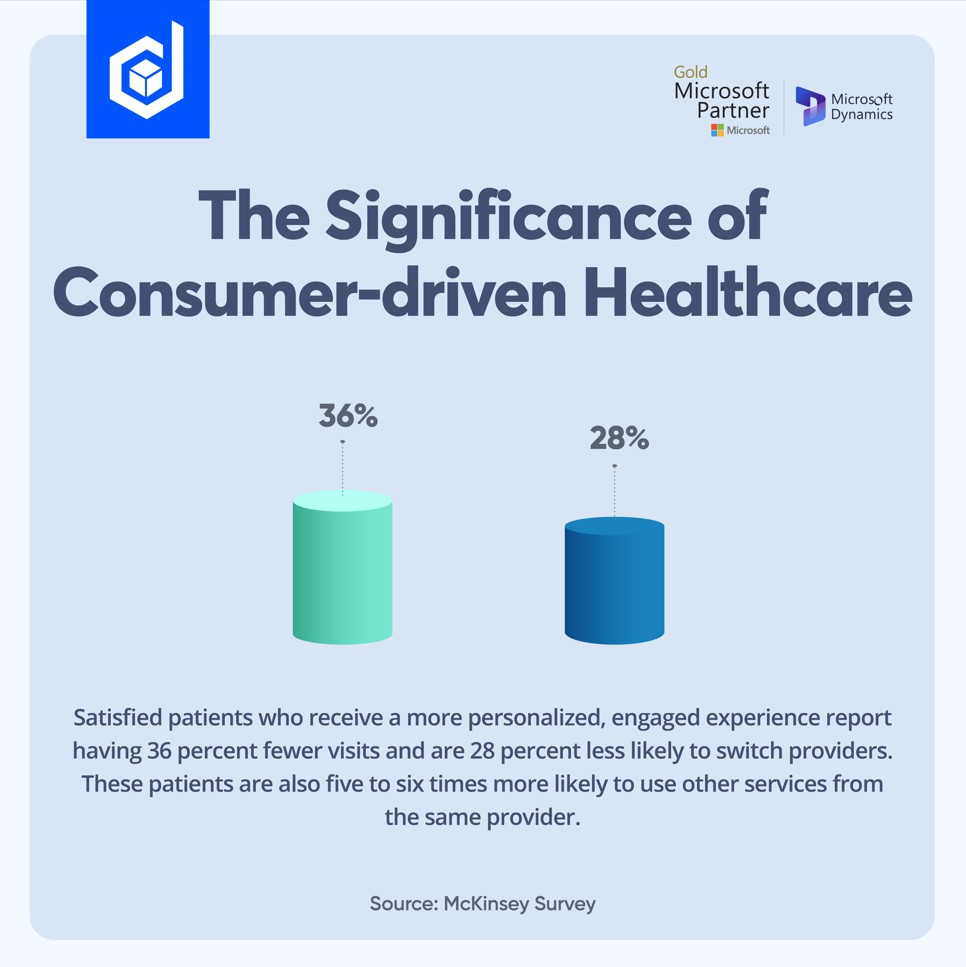The COVID-19 pandemic drove changes in consumer expectations and innovations in healthcare delivery. With a greater emphasis on health and wellness and tighter budgets, health consumers have become more strategic about where they spend their money and the quality of treatment they want from their providers.
With a New Approach to Healthcare Industry with Dynamics 365 Business Solution, the robust solution Microsoft dynamics 365 for healthcare enables firms to manage all facets of their operations from a single, central system. Healthcare businesses can access a 360-degree view of patient records, paperwork, tasks, activities, and crucial analytics.
Additionally, healthcare systems are having trouble dealing with the effects of clinical burnout and the “great resignation,” which are still having a big influence on difficulties and budgetary implications. Healthcare organizations must quickly adjust to suit the demands of both patients and the people who care for them. Providers need to think about a wide range of new changes in order to adapt, including new care models, better patient access, flexible scheduling, improved clinical processes, and maintaining the highest standards of care.
This blog focuses on the benefits and features of Dynamics 365 in conjunction with the emergence of data-centric healthcare. In this regard, Let’s begin to comprehend the step-by-step guide.
Features of Dynamics 365 for healthcare:
✔️ Centralized System
✔️ Maintain all Patient Information
✔️ Safety and Accountability
✔️ Automatic Notifications
✔️ Real-time Data
✔️ Beneficial Integration
“Dynamics 365 enables teams to coordinate treatment across healthcare providers and patient care is altogether reimagined. Businesses in this sector can experience rich data, better clinical and operational insights that aid in risk prediction and eventually improve patient health outcomes.”
Data Management in Healthcare:

As Microsoft dynamics 365 for healthcare solutions are concerning globally, Microsoft is intentionally innovating with data at the heart of its ongoing Microsoft Cloud strategy. Microsoft Dynamics 365 significantly simplifies the management, integration, and use of healthcare businesses’ entire data estate for all kinds of healthcare providers.
With the new Data Integration Toolkit in D365, IT administrators and integration specialists can set up, configure, and manage their healthcare data integration components with a single pane of capabilities and tools.
As a result, facilitating health data interaction within an internal organizational structure will be quite seamless.
Microsoft Dataverse: Azure Health Data Services
Microsoft continues to invest in health sector data models in an effort to improve people’s lives, Healthwise. Health data models make data management and app development simpler by combining data into standard data model shapes and enforcing consistency across several apps and deployments. As a result, multiple health data systems may exchange data more quickly and easily. Microsoft will release a Payor data model later this year that includes the HL7 FHIR R4 entities for health insurers and payors.
Furthermore, Microsoft Cloud for Healthcare uses data models that are inspired by FHIR R4 to connect various systems and applications by giving them access to a “shared data model.” The ‘Provider data model’ update, which this month was released, contains an updated collection of HL7 FHIR R4 entities that are often utilized by customers and partners to create or enhance their own (customized) healthcare apps using Microsoft Cloud for Healthcare.
In order to help enterprises, generate value more quickly and increase their resilience to propel growth, partnering in this changing healthcare environment necessitates quick responsiveness, predictive capacities, and ongoing innovation.
For their business data warehousing, clinical and operational analytics, or lake house efforts, organizations might spend a lot of time today creating a unified and consistent approach. Templates for healthcare providers, payers, medicines, clinical trials, retail pharmacies, and genomics are included in the recently released Microsoft update.
Microsoft’s industry health database templates in Azure Synapse serve as models and help enterprises swiftly launch their analytics-based industry use cases so healthcare organizations may continue to function effectively. Clients and partners may modify and expand these standard templates, using Azure Synapse’s database editor.
Benefits of D365; Transforming Healthcare for the better
- Better experience from beginning to the end
- Better Solutions and Better Care with innovative steps
- Continually analyze and improve processes!

Delivering Better Healthcare: Enhanced Patient Engagement
The economic argument for patient-centered healthcare is undeniable. Greater patient satisfaction and lower healthcare costs can result from improving the overall patient experience such that it is convenient, accessible, and personalized.

Despite the fact that patients may typically be more engaged in their healthcare, satisfied patients feel more empowered to partake in their own health matters and believe they are receiving better treatment, which leads to better outcomes overall.
To deliver a more complete 360-degree patient picture, which is at the core of many healthcare operations, we have further enhanced patient insights in our most recent update. Care teams may now access pertinent data more quickly thanks to the Patient snapshot (usually accessible) in the Unified patient view.
It enables an organization to maximize the patient view summary by customizing its own end-to-end scenarios using low- and no-code solutions like Microsoft Power Apps. Organizations may now provide distinctive snapshots that address the most pertinent use cases and assist in more effective and swift healthcare management.
Microsoft also added a new feature called Patient Trends Preview to its Unified Patient View that allows users to share patient indicators based on computed measures and insights about their activities, such as the number of days since their last appointment or the number of hospitalizations they’ve had in the previous year. Once deployed, this functionality may be altered to assist each business measure the right activities.
Microsoft Products: Revolutionizing Global Healthcare
Utilizing holographic, step-by-step instructions, Dynamics 365 mixed reality on the HoloLens 2 enables healthcare professionals to train medical personnel more successfully and efficiently. Dynamics 365 Guides on HoloLens 2 offer medical institutions the ability to provide continuous learning and widespread knowledge exchange while dispensing with the requirement for subject matter experts to be physically present. In a nutshell, Dynamics 365 improves clinical operations and helps them adapt to the speed of change.
D365, Azure, and Microsoft Power Platform: A comprehensive synergy for improved global healthcare
The time and resources wasted as a result of missed appointments may be quite costly for medical institutions. Not only do they cause patients’ health to deteriorate, but they also have negative financial effects on clinic operations and fixed cost estimates. As a result, staffing levels are increased and unplanned downtime occurs, which makes it difficult for healthcare providers to carry out their daily duties. Further studies have revealed that patients who have previously skipped appointments are far more likely to do so again.
A fully integrated AI solution called the newMissed Appointment Prediction (preview) enables businesses to utilize AI to determine how likely it is that a patient will miss their following appointment. The elements that affected the forecast are also explained to consumers. In order to ensure that patients will show up for their next visit and preserve the continuity of treatment, organizations may now utilize these predictions to enhance the decision-making process and take proactive actions, such as care coordinators contacting the patient in advance. Patients may rest easy knowing that their doctor’s office values scheduling appointments that fit their schedules, cultivate relationships with them, and provides superior patient-centric treatment.
Orient your Organizational Progress!
Today, streamlining Microsoft dynamics 365 for healthcare operations are required in multiple industries with intelligent technological resolve.
In these circumstances, the cloud is brimming with prospects of success, and Microsoft Azure is the Silver Lining for your Business obstacles. Azure migration helps you plan and implement your transfer to the cloud with integrated tools and track your progress using a streamlined dashboard. Azure is a long-term solution for your needs because of its ongoing support and cost-effectiveness.
Plan your Digital Transformation Now!
With Microsoft Dynamics 365 Solution, Dynamics Solution and Technology have a proven track record of success across multiple regions.
We have Got You Covered!

Dynamics Solution and Technology got Microsoft certified professionals who are well-versed in Microsoft Azure, with all its intricacies and how it interacts with other Microsoft products. Apart from employing Dynamics 365 for Healthcare, We at DST have industry-leading performance, enabling worldwide clients’ simplicity of Azure setup (Migration and Upgrade) and support. Aside from Azure, we digitally transform your business by leveraging Dynamics 365 competent and real-time scalability with high efficiencies.
To experience agility beyond norms with tailored solutions for your worldwide enterprises.







